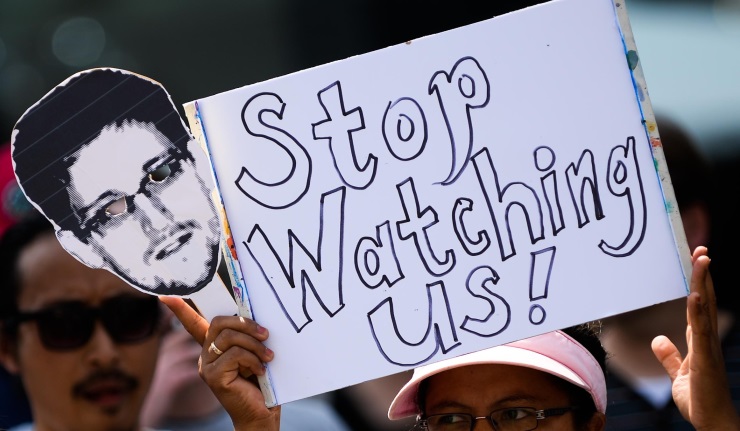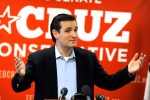On Wednesday, the Obama administration released several newly declassified intelligence documents in a damage control attempt over the growing NSA snooping scandal. On the same day, the Guardian reported on the NSA tool XKeyscore, which can track everything people do online, including emails, Facebook activity, online chats and browser histories. The White House just can’t keep ahead of the bad news.
Videos by Rare
The administration maintains that these programs are necessary for the fight against terrorism, but the American people are not convinced. A new survey released by the Pew Research Center for the People and the Press finds that 56% of Americans believe that “federal courts fail to provide adequate limits on the telephone and internet data the government is collecting as part of its anti-terrorism efforts.” And for the first time in the 10 year history of this poll, more people (47%) say the government has gone too far in restricting civil liberties than those who say it has not gone far enough to protect the country (35%).
This decisive change in attitude crosses the political spectrum. Republicans, Democrats and Independents have all seen double-digit shifts towards concern for liberty over security between October 2010 and July 2013. The shift is most pronounced among Tea Party members; in 2010 only a fifth of them believed the government had gone too far in restricting liberties, while 63% believed it should do more. In the new survey, the number of Tea Partiers concerned with government intrusion jumped to 55%, while those saying the state should keep ramping things up dropped more than half. The only group that showed no significant change in attitude was moderate to conservative Democrats, though the more interesting question is how the Pew Center located any members of this nearly extinct species.
The shift in attitude reflects a change in awareness. In 2010 few Americans knew the extent to which the government was logging the details of their daily lives. Proponents of widespread surveillance and data collection say that these methods keep Americans safer, and in some respects they do. But at some point the issue becomes how much intrusion on privacy is warranted for marginally decreasing increments of safety. No doubt the government could keep everyone safe from almost all terrorism, crime and other evils simply by monitoring everything, all the time, and flooding the country with special agents and block wardens. However, privacy has to count for something, and besides, all the sophisticated technology at the government’s disposal did not stop the Boston Marathon bombings. The best, most advanced counter-terrorism tools in the world can still fail in the hands of fallible people.
Competence is one matter, trust is another. The trade-off between safety and liberty involves a critical third variable, whether the government can be relied upon not to misuse these powerful, intrusive tools. The Pew survey found overwhelming concern that the government is abusing the public trust when it comes to snooping; seventy percent of Americans believe that the Federal government is using the data it collects for purposes other than fighting terrorism.
The White House sloughs off such concerns by saying “trust us,” but the American people simply don’t, and have good reason not to. As the snowballing IRS scandal shows, the administration is not above using official information for political purposes. Massive government databases make unprecedented amounts of information easily accessible, making them ripe for exploitation. The Obamacare “Data Hub” is another example of Federal overreach, which will contain comprehensive health and financial information just about everybody, with few safeguards and a high probability of being misused. It will be an irresistible gold mine for faceless government functionaries with rapidly diminishing ethical standards. Not to mention criminals, blackmailers, and opposition researchers with insider connections.
It will take more than the selective declassification of a few self-serving documents for the White House to regain the people’s trust. And the odds are that the American people still don’t know the worst of it.
James S. Robbins, Deputy Editor at Rare, is a former professor at National Defense University who specialized in counter-terrorism. He is the author of Native Americans: Patriotism, Exceptionalism, and the New American Identity. Follow him on Twitter @James_Robbins




12 Comments
Leave a Reply12 Pings & Trackbacks
Pingback:Chad’s Morning Brief: Should Campus Carry be Added to the Special Session? Ted Cruz Seeks Help From the Grass Roots, & More
Pingback:Reagan Reports for America
Pingback:Day Two from Pittsburgh! | The Jeff Scott Show
Pingback:Thurs. Show Prep – Leaving On A Jet Plane Edition « ProductionNinja.com
Pingback:Americans Distrust Government Over NSA Scandal | Infinity News Network
Pingback:End Times Prophecy Headlines: August 1, 2013 | End Times Prophecy Report
Pingback:The innocent Google search that got one couple in trouble | Rare
Pingback:Dead Cats: CNN!, 08/02/13, (9)15: James Brody | Dead Cats & Clippings
Pingback:Forbidden News » NSA scandal shakes Americans’ trust in government
Pingback:Snowden ‘exhausted,’ misses girlfriend | Rare
Pingback:The New York Times Editorial Board hammers Obama on the Obama NSA Scandal | akula51 dot net
Pingback:NSA scandal shakes Americans’ trust in government